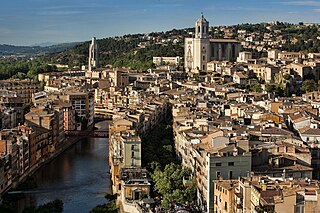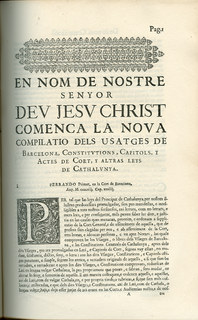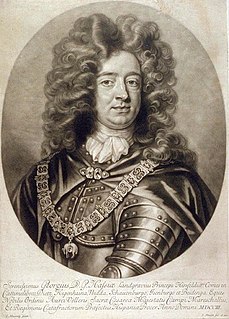A prince is a male ruler or a male member of a monarch's or former monarch's family. Prince is also a title of nobility, often hereditary, in some European states. The feminine equivalent is a princess. The English word derives, via the French word prince, from the Latin noun prīnceps, from primus (first) and capio, meaning "the first, foremost, the chief, most distinguished, noble ruler, prince".

Girona is a city in northern Catalonia, Spain, at the confluence of the Ter, Onyar, Galligants, and Güell rivers. The city had an official population of 101,852 in 2019. Girona is the capital of the province of the same name and also capital of the comarca of the Gironès and the vegueria of Girona. Since much of the old quarter of this ancient city has been preserved, Girona is a popular destination for tourists, and film productions have used it as a filming location. The city is located 99 km (62 mi) northeast of Barcelona City.
Fürst is a German word for a ruler and is also a princely title. Fürsten were, since the Middle Ages, members of the highest nobility who ruled over states of the Holy Roman Empire and later its former territories, below the ruling Kaiser (emperor) or König (king).
Princeps is a Latin word meaning "first in time or order; the first, foremost, chief, the most eminent, distinguished, or noble; the first man, first person". As a title, "princeps" originated in the Roman Republic wherein the leading member of the Senate was designated princeps senatus. It is primarily associated with the Roman emperors as an unofficial title first adopted by Augustus in 23 BC. Its use in this context continued until the reign of Diocletian at the end of the third century. He preferred the title of dominus, meaning "lord" or "master". As a result, the Roman Empire from Augustus to Diocletian is termed the "principate" (principatus) and from Diocletian onwards as the "dominate" (dominatus). Other historians define the reign of Augustus to Severus Alexander as the Principate, and the period afterwards as the "Autocracy".
Grand prince or great prince is a title of nobility ranked in honour below king and emperor and above a sovereign prince, and debatably ranked below an archduke.

The Crown of Aragon was a composite monarchy ruled by one king, originated by the dynastic union of the Kingdom of Aragon and the County of Barcelona and ended as a consequence of the Spanish War of Succession. At the height of its power in the 14th and 15th centuries, the Crown of Aragon was a thalassocracy controlling a large portion of present-day eastern Spain, parts of what is now southern France, and a Mediterranean "empire" which included the Balearic Islands, Sicily, Corsica, Sardinia, Malta, Southern Italy and parts of Greece.
Robert d'Aguiló, also known as Robert Bordet, was a Norman knight who moved from Normandy to Catalonia in the early 12th century. He was a native of Cullei, as reported by Orderic Vitalis, and his name d'Aguiló is a catalanized form of "d'Aculley" or "de Culley" that he adopted after marrying the daughter of a Catalan noble.
Princess is a regal rank and the feminine equivalent of prince. Most often, the term has been used for the consort of a prince, or for the daughter of a king or prince.

The Prince or Princess of Girona is a title that was historically the title accorded to the heir apparent or heir presumptive to the Crown of Aragon. Current legislation mandates the title of Prince of Asturias to the heir of the Spanish throne but allows for the use of other traditional titles; The current title-holder therefore, is Leonor, Princess of Asturias.

The Principality of Catalonia was a medieval and early modern state in the northeastern Iberian Peninsula. During most of its history it was in dynastic union with the Kingdom of Aragon, constituting together the Crown of Aragon. Between the 13th and the 18th centuries, it was bordered by the Kingdom of Aragon to the west, the Kingdom of Valencia to the south, the Kingdom of France and the feudal lordship of Andorra to the north and by the Mediterranean sea to the east. The term Principality of Catalonia remained in use until the Second Spanish Republic, when its use declined because of its historical relation to the monarchy. Today, the term Principat (Principality) is used primarily to refer to the autonomous community of Catalonia in Spain, as distinct from the other Catalan Countries, and usually including the historical region of Roussillon in southern France.
The title Duke of the Franks has been used for three different offices, always with "duke" implying military command and "prince" implying something approaching sovereign or regalian rights. The term "Franks" may refer to an ethnic group or to the inhabitants of a territory called Francia.

Prince of the Holy Roman Empire was a title attributed to a hereditary ruler, nobleman or prelate recognised as such by the Holy Roman Emperor.

The Usages of Barcelona were the customs that form the basis for the Catalan Constitutions. They are the fundamental laws and basic rights of Catalonia, dating back to their codification in the twelfth century.

Prince George Louis of Hessen-Darmstadt was a Field Marshal in the Austrian army. He is known for his career in Habsburg Spain, as Viceroy of Catalonia (1698–1701), head of the Austrian army in the War of the Spanish Succession (1701–1705) and governor of Gibraltar in 1704. He was killed during the Siege of Barcelona the following year. He was known in Spanish as Jorge de Darmstadt and in Catalan as Jordi Darmstadt.
The Samborides or House of Sobiesław were a ruling dynasty in the historic region of Pomerelia. They were first documented about 1155 as governors (princeps) in the Eastern Pomeranian lands serving the royal Piast dynasty of Poland, and from 1227 ruled as autonomous princes until 1294, at which time the dynasty died out. The subsequent war for succession between the Polish Piast dynasty, the Imperial Margraviate of Brandenburg and the State of the Teutonic Order resulted in the Teutonic takeover of Gdańsk (Danzig) in 1308.
The title Prince of Gothia or Prince of the Goths was a title of nobility, sometimes assumed by its holder as a sign of supremacy in the region of Gothia and sometimes bestowed by the sovereign of West Francia to the principal nobleman in the south of the realm, in the ninth and tenth centuries. Sometimes hereditary and sometimes not, the title has been rendered in English as Dukeof Septimania or Dukeof Gothia. A similar or the same "office" was often held with the title comes marcæ Hispanicæ: "Count of the Spanish March." The title was also a chronicler's device and, as presented in some chronicles, may never have been used in any official capacity.

The military history of Catalonia began in the thirteenth century, with the first exploits of the armies under the orders of Catalan rulers and lasting until today, where Catalan soldiers are integrated into international forces.
The House of Aberffraw is a historiographical and genealogical term historians use to illustrate the clear line of succession from Rhodri the Great of Wales through his eldest son Anarawd.
The Sagramental was a type of paramilitary organization native from the Principality of Catalonia, appearing in the Middle Ages. They were mutual-protection agreements, made under oath and thus called "sacramental."
The Prince of Darkness is a term used in John Milton's poem Paradise Lost referring to Satan as the embodiment of evil. It is an English translation of the Latin phrase princeps tenebrarum, which occurs in the Acts of Pilate, written in the 4th century, in the Historia Francorum by Gregory of Tours, in the 11th century hymn Rhythmus de die mortis by Pietro Damiani, and in a sermon by Bernard of Clairvaux from the 12th century.









